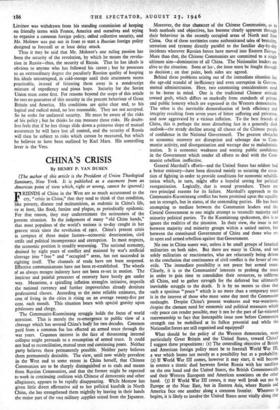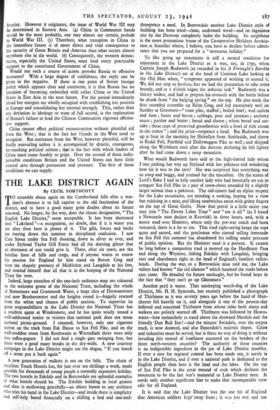CHINA'S CRISIS
By HENRY P. VAN DUSEN
(The author of this article is the President of Union Theological Seminary, New York. It is published as a statement from an American point of view which, right or wrong, cannot be ignored.) FRIENDS of China in the West are so much accustomed to the cry, " crisis in China," that they tend to think of that condition, like poverty, disease and malnutrition, as endemic in China's life, or at least, like flood, famine and plague, as periodically epidemic. For that reason, they may underestimate the seriousness of the present situation. In the judgement of many "old China hands," that most populous of the world's nations is to-day caught in her gravest strait since the revolution of 1911. China's present crisis is compact of three major factors—economic deterioration, civil strife and political incompetence and corruption. In most respects, the economic position is steadily worsening. The national economy, drained by eight years of conflict and maimed by war's artificial cleavage into " free " and " occupied " areas, has not succeeded in righting itself. The channels of trade have not been reopened. Effective communications have not been re-established. The wheels of an always meagre industry have not been re-set in motion. The intricate and painful processes of recovery have barely got under way. Meantime, a spiralling inflation strangles initiative, imperils the national currency and further impoverishes already destitute professional classes. According to the most reliable estimates, the cost of living in the cities is rising on an average twenty-five per cent. each month. This situation bears with special gravity upon prbfessors and clergy.
The Communist-Kuomintang struggle holds the focus of world attention. This is merely the re-emergence to public view of a cleavage which has severed China's body for two decades. Common peril from a common foe has effected an armed truce through the war years. Common interest in the face of threatening internal collapse might persuade to a resumption of armed truce. It could not lead to reconciliation, mutual trust and continuing peace. Neither party believes these permanently possible. Neither party believes them permanently desirable. The view, until now widely prevalent in the West and to some extent in China herself, that Chinese Communists are to be sharply distinguished as to ends and means from Russian Communists, and that the former might be expected to work in continuing coalition with Chinese of democratic and other allegiances, appears to be rapidly disappearing. While Moscow has given little direct affirmative aid to her political kinsfolk in North China, she has strengthened them mightily by leaving in their hands the major part of the vast military supplies seized from the Japanese.
Moreover, the true character of the Chinese Communists, as to both methods and objectives, has become 'clearly apparent through their behaviour in the recently occupied areas of North and East China. Out of these territories come authenticated tales of brutality, terrorism and tyranny directly parallel to the familiar day-by-day incidents wherever Russian forces have moved into Eastern Europe. More than that, the Chinese Communists are committed to a single ultimate aim—domination of all China. The Nationalist leaders are alive to the situation. Soon or late, the issue must be fought through to decision ; on that point, both sides are agreed.
Behind these problems arising out of the immediate situation lies the age-old scandal of inefficiency and even corruption in Govern- mental administration. Here, two extenuating considerations need to be • borne in mind. One is the traditional Chinese attitude toward graft, which differs so markedly from standards of private and public honesty which are espoused in the Western democracies. The other is the inevitable demoralisation of both efficiency and integrity resulting from seven years of bitter suffering and privation, and now aggravated by a vicious inflation. To the best friends of China, this is perhaps the most disturbing fact in a generally dark outlook—the steady decline among all classes of the Chinese people of confidence in the National Government. The greatest obstacles to economic recovery are disruption and sabotage due to Com- munist activity, and disorganisation and wastage due to maladminis- tration. It is economic weakness and waning public confidence in the Government which render all efforts to deal with the Com- munist rebellion ineffective.
General Marshall's efforts—and the United States has seldom had a better emissary—have been directed mainly to securing the cessa- tion of fighting in order to provide conditions for economic rehabili- tation which, in turn, might offer a hopeful setting for political reorganisation. Logically, that is sound procedure. There are two principal reasons for its failure. Marshall's approach to the Communist-Kuomintang conflict has been premised upon the equality not in strength, but in status, of the contending parties. He has been attempting to mediate between the Communist leaders and the Central Government as one might attempt to reconcile majority and minority political parties. To the Kuomintang spokesmen, this is to ignore the realities of the situation. In their view, the issue is not between majority and minority groups within a united nation, but between the constituted Government of China and those who are in open and armed rebellion against that Government.
No one in China wants war, unless it be small groups of fanatical militarists on both sides. But there are many in China, and not solely militarists or reactionaries, who are reluctantly being driven to the conclusion that continuance of civil conflict is the lesser of two evils. The immediate possibility is not peace but armed truce. Clearly, it is to the Communists' interests to prolong the truce in order to gain time to consolidate their resources, to infiltrate all China, and to gather strength for the deferred but ultimately inevitable struggle to the death. It is by no means so clear that such a specious " peace " which is no more than a temporary truce is in the interest of those who must some day meet the Communist onslaught. Despite China's present weakness and war-weariness, despite the clamant need for economic and political measures which only peace can render possible, may it not be the part of far-visioned statesmanship to face that inescapable issue now before Communist strength can be mobilised at its fullest potential and while the Nationalist forces are still organised and equipped?
What should be the policy of the Western democracies, more particularly Great Britain and the United States, toward China? I suggest these propositions: (t) The controlling objective of British and American foreign policy must be to forestall World War III, a war which looms not merely as a possibility but as a probability. (2) If World War III comes, however it may start, it will become in essence a titanic duel between Soviet Russia with her satellites on the one hand and the United States, the British Commonwealth and their Western European and American associates on the other hand. (3) If World War III comes, it may well break out not in Europe or the Near East, but in Eastern Asia, where Russia and America face one another along a common frontier. Wherever it begins, it is likely to involve the United States most vitally along that frontier. However it originates, the issue of World War III may be determined in Eastern Asia. (4) China in Communist hands would be the most probable, one may almost say certain, prelude to World War III. (5) Therefore, what transpires in China in the immediate future is of more direct and vital consequence to the security of Great Britain and America than what occurs almost anywhere else in the world. (6) Consequently, the western democ- racies, especially the United States, must lend every practicable support to the constituted Government of China.
Would not such a course of action provoke Russia to offensive measures? With a large degree of confidence, the reply can be given in the negative. If there is one point of Soviet foreign policy which appears clear and consistent, it is that Russia has no intention of becoming embroiled with either China or the United States in East Asia in the near future. For the period immediately ahead her energies are wholly occupied with establishing her position in Europe and consolidating her internal strength. This, rather than any deviation in ideology or want of full accord, is the explanation of Russia's failure to lend the Chinese Communists vigorous affirma- tive support.
China cannot effect political reconstruction without plentiful aid from the West ; that is the fact her friends in the West need to recognise. But assistance from the West, however plentiful, will be finally unavailing unless it is accompanied by drastic, courageous, far-reaching political reform ; that is the fact with which leaders of China must come frankly to grips. Over the second of those indis- pensable conditions Britain and the United States can have little control save through persuasion and pressure. The first of those conditions we can supply.



























 Previous page
Previous page